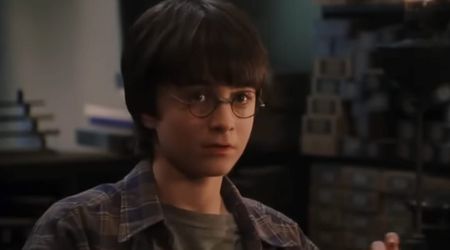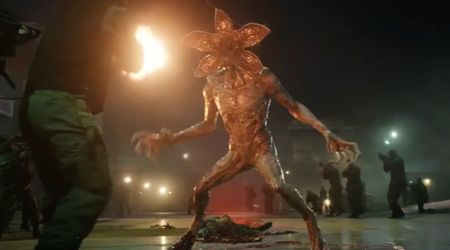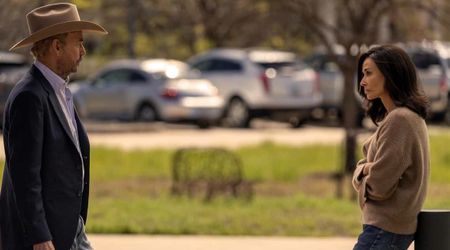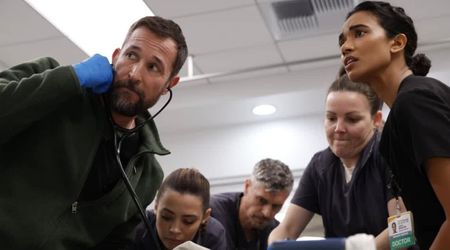'I'll Be Gone in the Dark' Episode 5 Review: Did pills kill Michelle McNamara, was she addicted to drugs?

"It kills me sometimes, how people die..." author Markus Zusak wrote in 'The Book Thief'. He also wrote, "Even death has a heart." The horror of Michelle McNamara's death is like that — it makes your heart pound against the chest and peels the flesh out of your bones. On April 21, 2016, the brilliant true crime writer died in her sleep at 46.
The McNamara family was devastated and for her comedian-husband, Patton Oswalt, it was an incomprehensible tragedy. The shock came like an ocean wave — it suddenly flowed in with unimaginable power and engulfed all it could in its might. In one moment, everything changed. In HBO's ‘I'll Be Gone in the Dark’, Oswalt pondered about that dark day, wishing it was just a nightmare and said: "I can't trust my memories from that time... I was very, very frightened."
Calling it the second worst day of his life, he said the worst day was when he had to tell their daughter Alice about the death. "I had to look at this person who meant everything to me and take everything from her," he said.

The fifth episode 'Monsters Recede but Never Vanish' begins right where the last one ended and delves deeper into the aftermath of her death. How did the McNamaras cope with the loss? The one-hour long drama began with Mary Rita Skrine, who recalled how Patton called her and said Michelle didn't wake up and that she's dead. She couldn't fathom the reality and the tragedy became a blur in her eyes. Kathleen Conroy, Michelle's sister, says she was watching musician Prince's story unfold on TV — how he died at 57 — when she got the call. "I couldn't wrap my head around how she could die in her sleep," she said. A wild coincidence, wasn't it?
Michelle's sister Maureen Stratton said it's a bit of a blur and called it "horrible". With tears in her eyes, she reflected on how Michelle never told anyone what she was going through. "She kept saying it's bad but she never told me what had happened," she said. What happened to Michelle's daughter after her death? Mary remembered how Michelle's daughter said she knew what her "rose" and "thorn" were. "My rose is that all of you are here but my thorn is that my mom is gone," she said.
As Michelle's loved ones dealt with her death, her work to unmask the Golden State Killer lived on. Taking inspiration from McNamara's interest in genealogy and online DNA testing services, Paul Holes, Chief of Forensics in Contra Costa County, reconstructed the killer's family tree with the help of genetic genealogist Barbara-Rae Venter.

Meanwhile, Patton told the publishers to resume where she left off. "Someone had to go through her computer," the publishers thought and put Michelle's researcher Paul Haynes to the task. He also inherited those 37 boxes of case files. It was then that he stumbled upon a file named "Letter to an Old Man", which eventually became the epilogue of the book. A friend and true-crime writer, Billy Jensen, joined hands with Michelle's husband to help finish her book, which went on to become an instant bestseller.
Stunned by the news of her death, TV channels widely reported it and wondered what led to it. The release of her autopsy report rocked her inner circle. The biggest question on all minds was: Why was Michelle taking all those pills? Was Michelle addicted to drugs? Did overdose of pills kill her?
After examination, the autopsy report signed by coroner Maria Campos ruled her death as an "accident" and the cause was "effects of multiple drugs". The report read: "Multiple pills and a white powdery substance were present at the scene." It then continued: "There were no traumatic injuries or evidence of foul play." How did the injury occur? That section in the autopsy report read: "Fentanyl, alprazolam (Xanax), Adderall, and amphetamine intake."

In the HBO documentary, as the cause of her death is analyzed, it appears that for Michelle painkillers were a joy. "Fentanyl is stronger than morphine," the documentary revealed and added it was the "one reason why we see a spike in drug overdose deaths". Confessing he didn't know how serious it could be, Oswalt then said, "She said it so casually... I am taking this pill, that pill. I didn't realize that it piles up, it does... This is something I carry with me forever — not knowing (about it)."
Looking at her past, Michelle's sisters said how the addiction issues grew on her but they had "no idea about Michelle's struggle". It was an internal struggle. Was it in her genes? As astonishing as it may seem, the answer was yes. Her father Thomas W McNamara, a trial lawyer, had an addiction problem and even went to rehab. Michelle probably got it as a genetic issue but never told anyone about it. She dealt with her demons alone and that eventually led to her death.
Directed by Elizabeth Wolff, the episode is a hard-hitting stance on the aftermath of Michelle's death and how the real Golden State Killer was finally found. Catch the episode once it premieres on HBO this July 26, 2020, from 10 pm ET to 11 pm ET.










